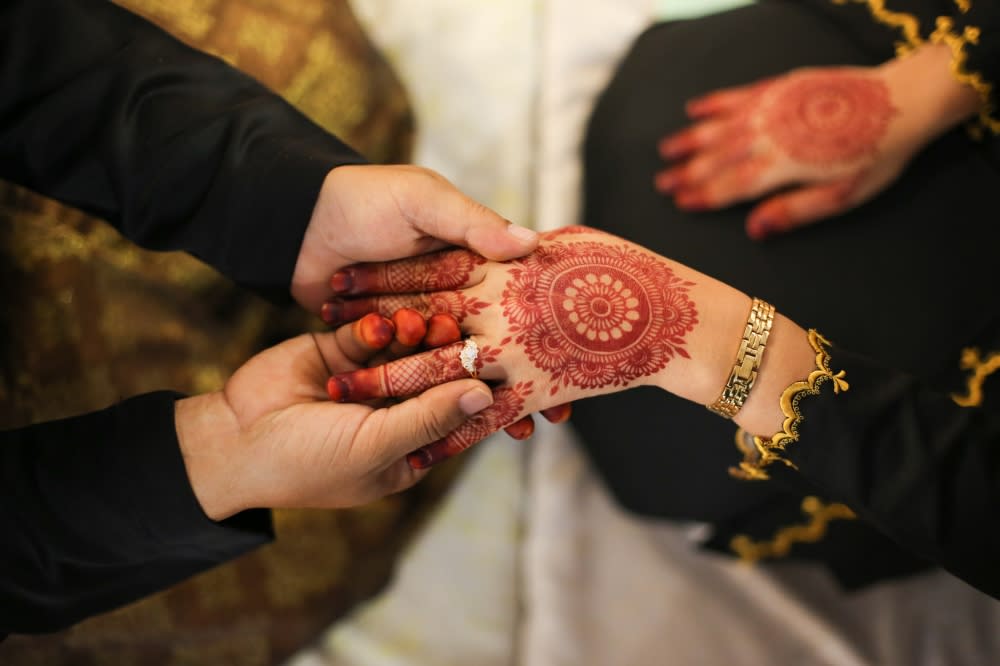UN report shows women aged 20 and below make up almost half of marriages in Sabah

KOTA KINABALU, Nov 6 — Almost half of marriages in Sabah are of women who were married by the age of 20, according to a new report on the demographics and socioeconomic changes of Sabah.
The report, funded by the United Nations Population Fund (UNFPA), showed that almost a quarter — 23.1 per cent — were married before they turned 18 and more than 26 per cent were between the ages of 18 to 20 years.
“In other words, almost half of married women had married by the age 20,” said the report.
About 15 per cent each was married at the ages of 24 and 26.
The proportion of marrying before 18 decreased from 40.6 per cent among women aged 55 and 59 to 8.6 per cent among those aged 25 and 29.
“While these figures indicate that child marriage rates have reduced, the prevalence of child marriage is higher among rural women in Sabah and decreased with higher educational attainment,” said the report.
University Malaysia Sabah associate professor Janice Nga said that the incident of such young marriages was often due to external pressures like financial and family, especially from lower education backgrounds, and sometimes even in rape cases.
In Sabah, 334 underage marriages occurred in 2018 which is 18 per cent of 1,856 marriages across the country. A majority of these marriages occured within the Bumiputera category.
Often, such marriages meant that the bride would end up with a bleak future, with little to no education and no income of their own.
“There have been previous efforts to raise the age of marriage from 16 to 18 years, but this has been overlooked following more political changes,” she said.
She also pointed out that such legislation was often difficult to get passed as it interfered with religious and cultural practices.
The issue of gender disparities in labour force participation remains. In Sabah, only 49.1 per cent of married women participate in the workforce, compared to a significantly higher figure of 96.8 per cent for married men.
However, the report also showed that female labour force participation rate increased with higher educational attainment.
The state’s Economic Planning Unit deputy director Celestina Aron said that the state had plans to bring up the percentage to 60 per cent through various upskilling programmes especially for those who are into the gig economy.
“There is funding of RM5.8 million to implement programmes to uplift women and give them skills for the workforce. So the government is doing its part to fund programmes but we have yet to see results. To me, 49 per cent is still very low,” she said.
The report today also showed that there were challenges in family planning, with a higher unmet need for contraception, particularly among women with lower educational levels, older women, and women of Kadazan/Dusun ethnicity.
Like in other parts of Malaysia, there is also a low level of knowledge in sexual and reproductive health and family planning among youth but Sabah youth had the lowest family planning knowledge, with only 37.7 per cent having heard about it.
Strengthening implementation of The National Reproductive Health Education and Social Education (Pekerti) Policy and Action Plan that was adopted in 2012 as part of the strategies to ensure healthy lives and promote the well-being of all ages, in line with Goal 3 of the Sustainable Development Goals, is key, said the report.
According to the numbers, the proportion of the males and females who had sexual debut ranged from 6.7 per cent and 1.7per cent among those with lower secondary education to 11.8 per cent and 7.5 per cent among those with postsecondary education.
Females were more knowledgeable than males (49.1 per cent versus 34.2 per cent) when it came to contraception. A higher proportion of females than males reported knowing most contraceptive methods, except abstinence, cream, hormone dispatch, and male sterilisation (vasectomy).
Urban youths were more knowledgeable about family planning and the various methods compared to their rural counterparts.
The report that was released today was in collaboration with the Population Studies Unit, the University of Malaya and Universiti Malaysia Sabah.
The report, the first of its kind in the state, offers an in-depth look at the demographic changes and challenges faced by Sabah from aspects such as the population age-sex structure, health and education planning needs, the potential of youth, gender disparities in labour force participation and the state of family planning.
Crucially, the report acts as a database with key metrics to assess Gender Equity and sexual and reproductive health and rights in Sabah, in line with the state’s developmental journey towards achieving the 2030 Sustainable Development Goals (SDGs).
The findings of the study are set to provide policy and programme recommendations to enhance human capital and further support the empowerment of women and girls in Sabah, ultimately contributing to the state’s socioeconomic development and well-being.



